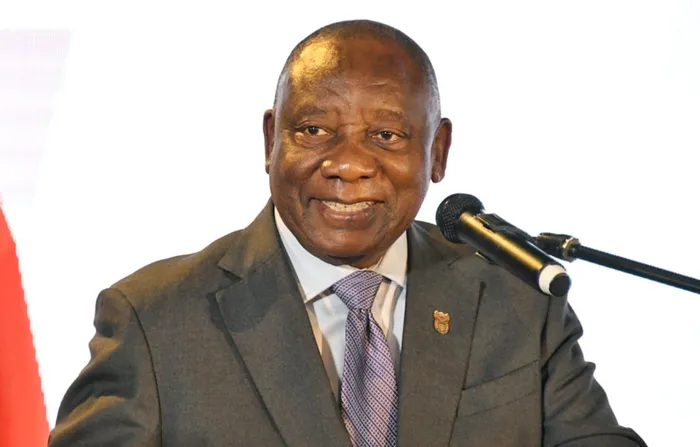SA will never get the best healthcare Ramaphosa is promising by implementing NHI: Maimane

President Cyril Ramaphosa’s NHI bill heavily opposed by opposition parties.
Various political parties vehemently oppose the implementation of the National Health Insurance (NHI) into law.
These political parties say the country’s health system was not ready for such bill to be implemented, as that would collapse the system.
Allied Workers Indaba Trade Union (AWITU) president Rich Sicina said the sudden hasty decision by government to sign the NHI bill into law was just an electioneering for the governing party.
Sicina continued to lambast the bill saying that as a union, they were not oblivious to the fact that this bill was going to fail.
“We are saying let the #NHIBill come. Let’s be clear, it will collapse, and when it does, let it fail for all of us in South Africa,” added Sicina.
He continued to say South Africans can no longer be fooled by the governing party’s theatrics.
Congress of the People (Cope) acting chairperson Pakes Dikgetsi said while they are in support of the principle of universal access to quality health care to address some of society’s inequality, it emphasised its disapproval of the bill.
Dikgetsi said the move by the governing party was just an opportunistic and partisan way that the NHI Bill was being forced through for narrow electioneering purposes.
“The current National Health Insurance Bill, which President Ramaphosa is unwisely determined to sign into law today is flawed in many aspects.
“For starters, it did not follow a proper, inclusive, rational legislative process and may not pass constitutional muster. The funding model and source of funding is unclear.
“It is a sensible practice to consider the cost implications of any Bill in the legislative process. Many proposals submitted by other stakeholders, including COPE, have been brushed aside,” party chairperson said.
Dikgetsi said as the organisation they believe that the process to achieve quality universal healthcare should not be irrationally rushed. Rather, it should follow a thorough strengthening of the current health care system, which was notorious for many institutional failures.
“This is a classic example of political arrogance and the imposition of the tyranny of the majority, which is characteristic of the ruling party and has been counter-productive for unity of purpose”.
United Democratic Movement (UDM) Secretary General Yongama Zigebe shared Cope’s sentiments by saying that signing of the bill in its current form and shape was irresponsible and an electioneering tool that the desperate (Always Nurturing Corruption) ANC was using to deceive voters.
Zigebe said the organisation has major concerns over the bill which according to them needed to be addressed comprehensively before the NHI can be effectively implemented.
“Implementing the NHI will require substantial financial resources. The UDM advocates for a rigorous assessment of South Africa’s budget capacity to absorb the costs associated with the NHI.
“This includes an in-depth analysis of current and projected government revenues, as well as potential funding gaps.
“Fiscal Responsibility: It is essential to ensure that the introduction of the NHI does not lead to unsustainable public debt or compromise other critical areas of public spending such as education, infrastructure, and social services.
“Cost Projections: Detailed cost projections for the NHI must be made public, including long-term sustainability plans. This transparency will help build public trust and allow for informed debate on the financial feasibility of the NHI.
“Economic Impact: We must consider the broader economic impact, including potential effects on taxation and economic growth. A balanced approach is necessary to avoid placing undue financial burdens on citizens and businesses,” he explained.
Meanwhile, BOSA leader Mmusi Maimane called on President Cyril Ramaphosa and his cabinet ministers to cancel their medical aids and use public healthcare with immediate effect.
Maimane said there must be a ban of senior officials and ministers from utilising or flying abroad to seek medical assistance.
“It is often said your health is your worth. The National Health Insurance, as envisaged by the ANC is going to be devastating for this country. We will have to profound skills flight of this country and ultimately it will drain the fiscus.
“This is a R500 billion investment that needs to go with a government that is already heavily indebted to, incapable of managing financial resources and ultimately has allowed the public healthcare sector to collapse,” BOSA leader said.
He further said the healthcare system collapsed due to poor leadership at a multiple place.
Maimane assured South Africans that with the implementation of the NHI people will never get the best healthcare Ramaphosa was promising.
“Ultimately when health care workers leave, you will end up with healthcare being outsourced elsewhere. Look at countries such as Zimbabwe and more. Their leaders could not even stay in their country for health, and they end up dying elsewhere.”
BOSA leader said as country people needed to be intentional about the Bill, adding that it must be rejected with everything they have got.
As the organisation, Maimane said they have always maintained that a dual system worked effectively, adding that of the key interventions that can be put on the table was to ensure that it was possible for competent and capable leadership to be appointed at these hospitals.
According to the Presidency, the signing of the bill ‘will transform South Africa’s healthcare system and ensuring universal coverage for health services. Through this, the country will overcome critical socio-economic imbalances and inequities of the past’.
The NHI Bill, was passed by the National Assembly and the National Council of Provinces last year.
The bill sought to provide free healthcare at the point of care for all South Africans, whether in public or private health facilities.
The Star
sipho.jack@inl.co.za